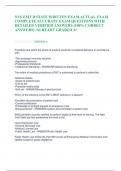NYS EMT B STATE WRITTEN EXAM ACTUAL EXAM
COMPLETE ACCURATE EXAM QUESTIONS WITH
DETAILED VERIFIED ANSWERS (100% CORRECT
ANSWERS) /ALREADY GRADED A+
VERSION A
Providing care within the scope of practice would be considered behavior in accordance
with:
-The sovereign immunity doctrine
-Approved protocols
-Professional Standards
-Institutional Standards - ANSWERProfessional Standards
The extent of medical procedures a EMT is authorized to perform is called the:
-Medical release
-Scope of practice/care
-Duty to act
-Physician relationship
-Skill set - ANSWERScope of practice/care
Which of the following is the EMT's BEST defense in a lawsuit?
-Excellent documentation of patient care
-Current certification
-Knowledge of all legal aspects of emergency care
-Being proficient - ANSWERExcellent documentation of patient care
EMS providers must be certified to perform legally at their level of training. The New
York State law that establishes this level is the:
-Good Samaritan Law
-General Municipal Law
-Medical License Law
-Public Health Law - ANSWERPublic Health Law
Public Health Law Article 30, Part 800 covers all Emergency Medical Technicians from
liability except for gross negligence
,The first action taken by the EMS provider at the scene of an emergency should be:
-Triage of all victims
-Completion of the initial scene size-up
-Notification to the electric and gas companies
-Requesting additional ambulances - ANSWERCompletion of the initial scene size-up
What is the legal basis for treating a patient whose judgement is impaired because
he/she is unconscious, severely ill, or badly injured?
-Applied consent
-Implied consent
-Informed consent
-Good Samaritan Act - ANSWERImplied consent
Which of the following arteries is the MOST RELIABLE for detecting an adult's pulse?
-Brachial
-Femoral
-Carotid
-Radial? - ANSWERCarotid
Difficulty sleeping, loss of appetite, and inability to concentrate are all warning signs of:
-Type A personality
-Job burn-out
-Diabetes
-Stress - ANSWERStress
A special kind of stress encountered by emergency responders that results from
exposure to incidents of a critical nature is:
-Pre-incident stress
-Personal stress
-Workplace stress
-Critical incident stress - ANSWERCritical incident stress
Which of the following is a warning sign of stress?
-Isolation
-Loss of appetite
-Problems sleeping
-Anxiety
-All of the above - ANSWERAll of the above
,During the Initial Assessment, after ensuring adequate respiration, what is the NEST
step in caring for a patient?
-Ensure adequate circulation
-Immobilize angulated fractures
-Check for paralysis of the limbs
-Determine level of consciousness - ANSWEREnsure adequate circulation
As you lift a patient into the rear of the ambulance, a reporter recognizes the patient as
a state senator. Immediately, the press demands to be told what has happened to the
Senator. You should:
-Advise the press that you are unable to comment
-Deny that patient is the Senator
-Tell the press your diagnosis
-Advise the press to contact the Senator's family - ANSWERAdvise the press that you
are unable to comment
If the patient care protocols have been revised, it is the EMS Provider's responsibility to:
-Attend in-service training with the agency medical director to become familiar with the
new protocols
-Continue to use the old protocols because they are already familiar
-Begin to use the new protocols as soon as the agency receives them
-Operate only when in direct communication with the physician - ANSWERAttend in-
service training with the agency medical director to become familiar with the new
protocols
You arrive at the scene of an automobile accident where several bystanders are trying
to remove an unconscious patient from one of the vehicles. What should you do?
-Have police respond to control the crowd
-Apply a cervical collar and help extricate the patient
-Have the crowd stop the extrication process immediately
-Tell the crowd to continue their extrication efforts - ANSWERHave the crowd stop the
extrication process immediately
A single EMT finds a non-breathing pulseless victim of a motor vehicle accident lying
prone in the road he/she suspects a spinal injury, the EMT should:
-Apply a cervical collar and attempt to ventilate
-Turn the patient's body as a unit and begin CPR
-Leave the patient in place and attempt to apply the principles of CPR
-Do nothing until help arrives - ANSWERTurn the patient's body as a unit and begin
CPR
, During the Initial Assessment, you are assessing a conscious trauma patient
complaining loudly of pain in the leg. You should:
-Begin to obtain the history
-Assess the leg immediately
-Discontinue the Initial Assessment, start the Detailed Physical Exam
-Continue with your initial assessment - ANSWERContinue with your initial assessment
If a EMT is transporting a patient to the hospital and the patient suddenly stops talking,
the next step should be to:
-Consult with an advanced EMS provider
-Repeat the Initial Assessment
-Initiate a priority transport
-Stop the ambulance - ANSWERRepeat the Initial Assessment
The overall purpose of the Initial Assessment is to:
-Identify and correct life threatening problems and set priorities
-Ensure that airway is open and locate breathing problems
-Identify and treat major extremities injuries
-Identify minor problems and provide treatment - ANSWERIdentify and correct life
threatening problems and set priorities
In what order is the Detailed Physical Exam usually conducted on an adult patient?
-Head, neck, extremities, chest, pelvis, abdomen
-Head, neck, chest, abdomen, pelvis, extremities
-Head, neck, abdomen, chest, pelvis, extremities
-Head, chest, abdomen, neck, pelvis, extremities - ANSWERHead, neck, chest,
abdomen, pelvis, extremities
A driver has crashed into a tree. In what order should you check for the signs of life-
threatening problems in this accident victim?
-Pulse, respirations, hemorrhage
-Respirations, hemorrhage, pulse
-Hemorrhage, pulse, respirations
-Respirations, pulse, hemorrhage - ANSWERRespirations, pulse, hemorrhage
If a life-threatening problem is discovered during the Initial Assessment, you should:
-Finish the Initial Assessment and then go back to correct the problem
-Complete both the Initial Assessment and the secondary survey
-Transport the patient to the hospital immediately




